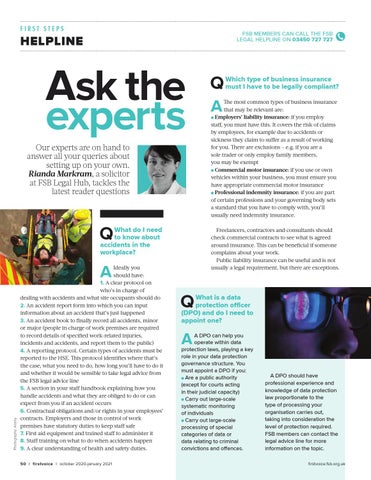FIRST STEPS
FSB MEMBERS CAN CALL THE FSB LEGAL HELPLINE ON 03450 727 727
HELPLINE
Ask the experts Our experts are on hand to answer all your queries about setting up on your own. Rianda Markram, a solicitor at FSB Legal Hub, tackles the latest reader questions
Q
What do I need to know about accidents in the workplace?
Photography: Alamy
50 | firstvoice | october 2020-january 2021
50 AskTheExperts_First Voice Oct-Dec 2020_First Voice 50
Which type of business insurance must I have to be legally compliant?
A
The most common types of business insurance that may be relevant are: Employers’ liability insurance: if you employ staff, you must have this. It covers the risk of claims by employees, for example due to accidents or sickness they claim to suffer as a result of working for you. There are exclusions – e.g. if you are a sole trader or only employ family members, you may be exempt Commercial motor insurance: if you use or own vehicles within your business, you must ensure you have appropriate commercial motor insurance Professional indemnity insurance: if you are part of certain professions and your governing body sets a standard that you have to comply with, you’ll usually need indemnity insurance. Freelancers, contractors and consultants should check commercial contracts to see what is agreed around insurance. This can be beneficial if someone complains about your work. Public liability insurance can be useful and is not usually a legal requirement, but there are exceptions.
A
Ideally you should have: 1. A clear protocol on who’s in charge of dealing with accidents and what site occupants should do 2. An accident report form into which you can input information about an accident that’s just happened 3. An accident book to finally record all accidents, minor or major (people in charge of work premises are required to record details of specified work-related injuries, incidents and accidents, and report them to the public) 4. A reporting protocol. Certain types of accidents must be reported to the HSE. This protocol identifies where that’s the case, what you need to do, how long you’ll have to do it and whether it would be sensible to take legal advice from the FSB legal advice line 5. A section in your staff handbook explaining how you handle accidents and what they are obliged to do or can expect from you if an accident occurs 6. Contractual obligations and/or rights in your employees’ contracts. Employers and those in control of work premises have statutory duties to keep staff safe 7. First aid equipment and trained staff to administer it 8. Staff training on what to do when accidents happen 9. A clear understanding of health and safety duties.
Q
Q
What is a data protection o cer (DPO) and do I need to appoint one?
A
A DPO can help you operate within data protection laws, playing a key role in your data protection governance structure. You must appoint a DPO if you: Are a public authority (except for courts acting in their judicial capacity) Carry out large-scale systematic monitoring of individuals Carry out large-scale processing of special categories of data or data relating to criminal convictions and offences.
A DPO should have professional experience and knowledge of data protection law proportionate to the type of processing your organisation carries out, taking into consideration the level of protection required. FSB members can contact the legal advice line for more information on the topic. firstvoice.fsb.org.uk
17/09/2020 15:28
